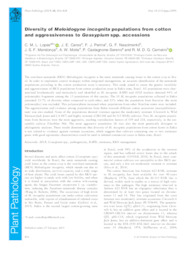Diversity of Meloidogyne incognita populations from cotton and aggressiveness to Gossypium spp. accessions.
Diversity of Meloidogyne incognita populations from cotton and aggressiveness to Gossypium spp. accessions.
Author(s): LOPES, C. M. L.; CARES, J. E.; PERINA, F. J.; NASCIMENTO, G. F.; MENDONÇA, J. S. F.; MOITA, A. W.; CASTAGNONE-SERENO, P.; CARNEIRO, R. M. D. G.
Summary: The root-knot nematode (RKN) Meloidogyne incognita is the main nematode causing losses to the cotton crop in Brazil. In order to implement control strategies within integrated management, an accurate identification of the nematode populations prevailing in the cotton production areas is necessary. This study aimed to assess the genetic variability and aggressiveness of RKN populations from cotton production areas in Bahia state, Brazil. All populations were characterized biochemically and molecularly and identified as M. incognita. RAPD and AFLP markers detected 44% of polymorphic fragments among the 13 populations of this species. The 10 M. incognita populations collected in Bahia presented 33.7% of diversity when compared to each other, and 25% when the population from Barreiras (the most polymorphic) was excluded. This polymorphism increased when populations from other Brazilian states were included. The aggressiveness and virulence among populations from Bahia towards different cotton accessions (susceptible/resistant) was also studied. None of the populations showed virulence against the moderately resistant (Clevewilt 6, Wild Mexican Jack Jones and LA 887) and highly resistant (CIR1348 and M-315 RNR) cultivars. Two M. incognita populations from Barreiras were the most aggressive, reaching reproduction factors of 539 and 218, respectively, in the susceptible cultivar FiberMax 966. The most aggressive population (8) was also the most genetically divergent in phylogenetic analyses. These results demonstrate that diversity of M. incognita populations from cotton farms in Bahia is not related to virulence against resistant accessions, which suggests that cultivars containing one or two resistance genes with good agronomic characteristics could be used in infested commercial areas in Bahia state, Brazil.
Publication year: 2019
Types of publication: Journal article
Unit: Embrapa Cotton
Keywords: AFLP, Gossypium spp, Pathogenicity, RAPD, RKN management, Resistance
Observation
Some of Embrapa's publications are published as ePub files. To read them, use or download one of the following free software options to your computer or mobile device. Android: Google Play Books; IOS: iBooks; Windows and Linux: Calibre.
Access other publications
Access the Agricultural Research Database (BDPA) to consult Embrapa's full library collection and records.
Visit Embrapa Bookstore to purchase books and other publications sold by Embrapa.

